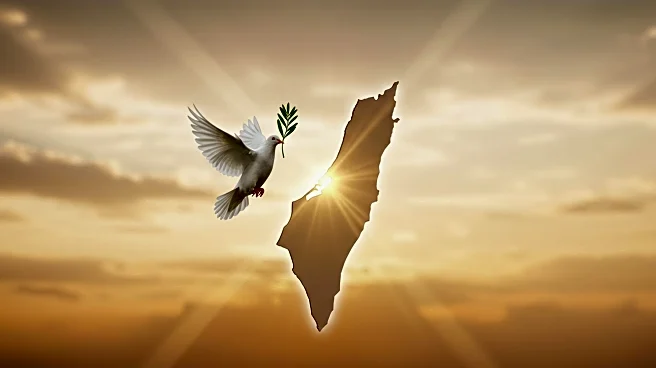What's Happening?
The United Nations Relief and Works Agency (UNRWA) has urged Israel to allow humanitarian aid into Gaza on a larger scale as famine conditions worsen. Philippe Lazzarini, the head of UNRWA, emphasized the urgency of the situation, stating that the famine is intensifying by the hour. The Integrated Food Security Phase Classification (IPC) has confirmed the presence of famine in parts of Gaza, with severe malnutrition affecting children and pregnant women. Despite these reports, Israel has denied the existence of a famine, attributing the crisis to Hamas's alleged diversion of aid. The ongoing conflict and blockade have severely restricted access to food and medical supplies, exacerbating the humanitarian crisis.
Why It's Important?
The situation in Gaza has significant implications for regional stability and international humanitarian efforts. The blockade and ongoing conflict have left the population heavily reliant on aid, with the UN and other organizations struggling to meet the growing needs. The denial of famine conditions by Israel complicates diplomatic efforts to address the crisis and may hinder the delivery of necessary aid. The humanitarian impact is profound, with vulnerable populations, particularly children, facing life-threatening conditions. The international community's response to this crisis could influence future humanitarian policies and the geopolitical landscape in the Middle East.
What's Next?
The UN and humanitarian organizations are likely to continue advocating for increased access to Gaza to deliver essential supplies. Diplomatic pressure on Israel may intensify as international bodies seek to address the humanitarian crisis. The situation could lead to further discussions at the United Nations and among global leaders to find a resolution that allows for the safe and efficient delivery of aid. The response from Israel and its allies will be crucial in determining the next steps in alleviating the crisis.
Beyond the Headlines
The crisis in Gaza highlights broader issues of humanitarian access in conflict zones and the challenges of delivering aid amidst political and military tensions. The situation raises ethical questions about the responsibilities of occupying powers and the international community in preventing and responding to humanitarian disasters. Long-term solutions may require addressing the underlying political conflicts and ensuring sustainable development and self-sufficiency for the affected populations.











